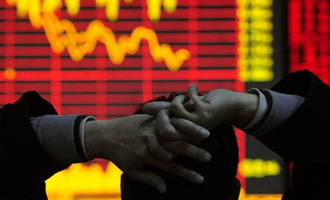
|  |  |  Business News | December 2008 Business News | December 2008  
World Markets Plunge as US Auto Bailout Fails
 Pan Pylas - Associated Press Pan Pylas - Associated Press
go to original


| | World stock markets plunged Friday on news that a multi-billion dollar deal to bail out Detroit car manufacturers had failed. The Bush White House is now considering using the $700 billion for the financial industry to assist US automakers. (Reuters) |  |
London - World markets fell Friday amid concerns about the future of the U.S. auto industry following the Senate's rejection of a $14 billion rescue deal.

However, the declines on Wall Street were less than futures markets were predicting ahead of the opening bell on indications that the White House is considering diverting money from the Wall Street rescue fund, or TARP, to stave off bankruptcy filings among the automakers.

The Treasury Department said it stands ready to "prevent an imminent failure" of the auto companies.

The Dow Jones industrial average was 157.07 points, or 1.8 percent, lower at 8,408.02, while the broader Standard & Poor's index was down 8.27 points, or 1.0 percent, at 865.32. Futures markets had been near 4 percent declines.

The smaller-than-anticipated losses helped Europe's indexes recoup some of their earlier losses. The FTSE 100 of leading British shares was down 139.30 points, or 3.2 percent, at 4,249.39, while Germany's DAX fell 161.40 points, or 3.4 percent, to 4,605.80. The CAC-40 in France fell 132.92 points, or 4.0 percent, to 3,173.21.

Despite hopes that the White House may use some of the $700 billion TARP to help Detroit's automakers, investors remained rattled by the state of the U.S. economy.

"At heart I would love to be able to say let all three go to the wall but I can't and the reason is simply a view that, if the indigenous U.S. car industry is allowed to go to the wall then the damage to the U.S. economy would then be manifest in the extreme," said Howard Wheeldon, senior strategist at BGC Partners.

The bankruptcy of any of the big American automakers would deal another blow to the world's largest economy, which is sliding deeper and deeper into recession.

The Commerce Department said retail sales dropped 1.8 percent in November, the fifth straight monthly drop. The weakness was led by a 2.8 percent fall in auto sales, a decline that had been expected given that automakers already had reported that November was their worst sales month in more than 26 years.

It's not just stock markets suffering in the wake of the failure of the Senate to pass the auto rescue deal. The dollar slumped overnight too, particularly against the yen.

The dollar fell to a low of 88.16 yen, its lowest level since Aug. 2, 1995 - before it recovered to trade above 90 yen.

That heaps more bad news on major Japanese exporters like Toyota and Sony - already reeling from waning global consumer demand - whose overseas income is eroded by an appreciating yen.

Toyota Motor Co. dived 10.1 percent, Nissan Motor Co. lost 11.5 percent and Sony Corp. fell 6 percent. South Korea's Hyundai Motor Co. shed 9.3 percent and Kia Motors Corp. was off 9.1 percent

The declines fueled the losses in Asia. Japan's Nikkei 225 stock average ended down 484.68 points, or 5.6 percent, to 8,235.87. Hong Kong's Hang Seng index slid 5.5 percent to 14,758.39.

Mainland China's stock market fell as investors were discouraged by the lack of any major new initiatives to spur the economy following a top-level economic conference earlier in the week. The benchmark Shanghai Composite Index dropped 3.8 percent to 1,954.21.

Figures this week show that China's economy is feeling the pinch of the global slowdown. For the first time in seven years, exports fell in November.

Oil prices retreated to below $45 a barrel Friday after rallying back above $47 on expectations of a big output cut from the OPEC oil cartel. Light, sweet crude for January delivery fell $3.52 to $44.46 a barrel in electronic trading on the New York Mercantile Exchange.

Meanwhile, the euro was 0.3 percent higher at $1.3385.

AP business writers Stephen Wright in Bangkok and Kelly Olsen in Seoul contributed to this story. |

 |
|  |



